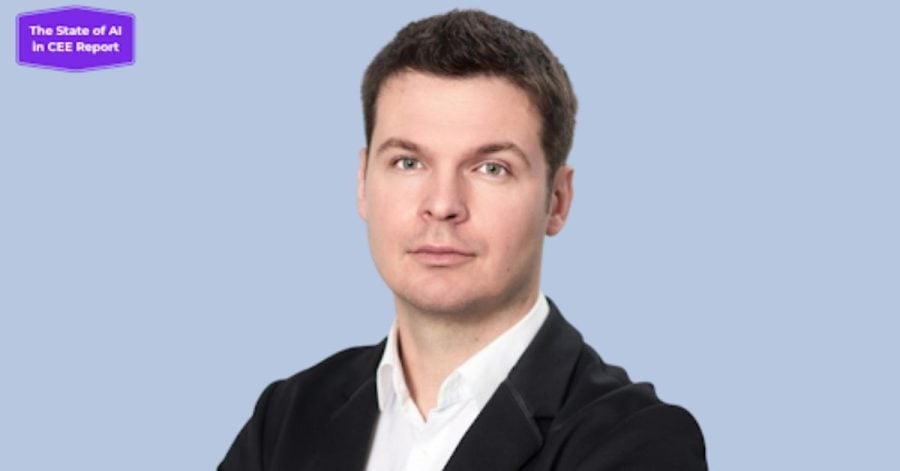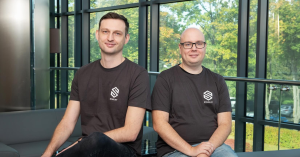Slovenian biotech company GenePlanet is a leading European provider of innovative healthcare and lifestyle solutions based on preventive genetic testing.
GenePlanet’s CEO Marko Bitenc is an experienced founder with a history of working in the biotechnology industry and a Master’s degree in the field from Wageningen University & Research. He also co-founded Spain-based Universal Diagnostics, an in-vitro diagnostics company developing a platform of minimally-invasive, blood-based solutions for the early detection of cancer.
In an interview with The Recursive, Bitenc discusses the key reasons for founding GenePlanet, the health challenges it aims to address, AI and biotech innovations, the role of large language models in genetics, and more.
The following interview was conducted as a part of The Recursive’s “State of AI in CEE” report. Download the full report with insights from 40+experts and analysis of 900 AI product companies from CEE here.
The Recursive: What are the key reasons you decided to start GenePlanet?
Marko Bitenc: I founded GenePlanet with a clear vision: empowering individuals to protect themselves from preventable health risks and make lifelong lifestyle changes for a better and healthier life.
I firmly believe that novel genetic-based information and personalized preventive guidelines can unlock a world of possibilities for everyone’s well-being.
It’s the driving force behind our mission to provide innovative healthcare and lifestyle solutions based on preventive genetic testing.
Which health challenges are you addressing?
Our portfolio addresses a wide range of products addressing different health challenges:
- Lifestyle DNA tests to optimize everyday habits for health and wellbeing
- Cancer risk DNA test to analyze risk of hereditary cancer
- Prenatal NIPT test to check the baby’s genetic health from week 10
- Pharmacogenomic test to speed up and optimize treatment
This way, we aim to empower people with the knowledge and insights they need to take control of their health and make proactive choices.
What are the biotechnology innovations that made possible genetic testing in the first place? What role does AI play?
The human genome project was completed in 2003. It proved the technological capability to decode the human genome, but it lasted 13 years and had a total cost of almost $3 billion.
Then came the series of technological innovations, most notably based on Next Generation Sequencing (NGS) technology, that dramatically reduced the costs of DNA sequencing.
It went from around 1 M EUR per human genome in 2007 to today’s less than 500 EUR.
As genome sequencing got cheaper, more genomes were sequenced, and the ability to compare groups with specific traits started to emerge.
Up to now, discoveries in genetics were not dependent on AI as we consider it today but rather on other established methods in data science and bioinformatics, such as Principal Component Analysis (PCA).
AI can be very powerful, but generally, it has specific requirements for the dataset – namely, it requires many more samples compared to the number of features under investigation.
In genetics, that is a challenge considering that the genome is 3.2 billion base pairs in length.
With novel AI methods such as the Large Language Models (LLMs) the popular ChatGPT is based on, the future of AI in genetics looks bright.
DNA is essentially a language of its own; therefore, AI will be able to interpret it, assemble the correct sequences with specific properties based on requests, etc.
What role do you see AI play in the wider healthcare industry?
AI has the potential to revolutionise healthcare in countless ways.
From improving the detection and diagnosis of diseases to facilitating the discovery of new treatments, AI is set to transform the landscape of medicine.
At GenePlanet, we recognise the power of AI in driving the future of healthcare. It plays a crucial role in analysing vast amounts of genetic data, identifying patterns, and generating valuable insights.
This, in turn, paves the way for a new era of personalized healthcare, where treatments and interventions can be tailored to an individual’s unique genetic makeup.
AI promises a more efficient, effective, and patient-centric healthcare system, and we are actively harnessing its potential to shape the future of medicine.
What are some of the biggest challenges you have faced as you were developing the product and growing the company, and how did you overcome them?
One of our most significant challenges during the company’s growth was managing the pace. As our product became popular, we grew faster than anticipated. This rapid expansion meant we had to hire more people quickly, and finding the right fit for our team wasn’t always easy. At the same time, we were keen on introducing our product to new markets.
So, instead of diving into multiple markets all at once, we started to prioritize. We chose to focus on a few key markets first, understanding their specific needs and tailoring our approach accordingly.
We also took a step back and invested in a thorough hiring process, so we could board individuals who had the right skills and shared our commitment.
How do you see the current state and trajectory of the AI-powered product market in Slovenia? How about the wider CEE region?
AI is quickly becoming an essential part of every software product.
From customers’ perspective, the user experience will improve dramatically, and from the company’s perspective, the workforce’s productivity will also substantially increase.
This is independent of the region, and in most cases, integration of AI is going to be affordable for the company in many use cases.
What are you currently missing or would like to see more of when it comes to AI and deep tech innovation support in Slovenia and the region?
If a company is trying to train its own large language model, the cost is the biggest limitation. It can go into tens of millions or even more than a hundred million euros.
And that is just for the training of the model alone, not to mention that currently, there is much more demand for hardware than there is supply.
Such products generally require significant upfront funding, which is not common for our region.
You have recently raised a Series B round. How was the process of finding and locking in funding and investor support for your startup?
For our fundraising process, it was crucial to find a partner able to support our growth ambitions not only with capital but also with support in opening markets, acquiring companies and expanding our business portfolio.
Therefore, we have spent time in the initial stages of the discussion to understand what synergies we can expect when partnering with a potential new investor.
The process, otherwise, as any other M&A transaction, required quite some resources and management time. Besides the most common due diligence fields (finance, legal, tax, technology, etc.) our ESG processes were also reviewed and assessed.
What’s next for GenePlanet?
Our next steps involve further global expansion, with a strategic focus on expanding our reach across Europe and Latin America.
In addition, we are committed to new product development, such as a robust big data infrastructure that will enable us to analyse vast amounts of genetic data and extract meaningful insights.
And, of course, the development of an advanced LLM AI system. This platform will revolutionise the interpretation of the human genome, taking personalised medicine to new heights.
We believe this innovative approach will unlock unprecedented health benefits for individuals globally.








